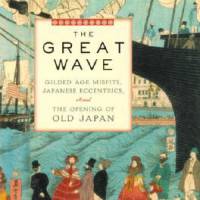The phrase oyatoi gaikokujin refers to foreigners hired by the Meiji Era government and various educational institutions to impart their skills to Japanese eager to advance in the modern world.
The Great Wave, by Christopher Benfey.
Random House, Nonfiction.
There was a veritable legion of them, including Scottish sanitary engineer William Kinnimond Burton, German architect Wilhelm Bockmann, art epicure Ernest Fenollosa and extraordinary Australian Henry James Black, who made a name for himself performing on the stage in fluent Japanese. In this great wave of curiosity and opportunism, a surge of interest in America brought people from the new world to Japan, a nation still mothballed in traces of feudalism.
With a superabundance of material to work with, Christopher Benfey explores the cultural reciprocity, the common ground and unbridgeable divides, the loss of innocence and the gaining of wisdom experienced between the newcomers and their hosts.
Benfey writes in an engaging, anecdotal style, with not a little irony. On Japan's newfound infatuation with everything Western and the efforts of Bostonian collectors to save the country's heritage, the author comments, "(If) the Japanese did not intend to preserve Old Japan, then someone else would have to do it."
The author, with a strong handle on both cultures, chronicles these encounters and misadventures with wit, erudition and attention to historical detail. If the book were not so well written, it could almost be called scholarly.
Read archived reviews of Japanese classics at jtimes.jp/essential.



















With your current subscription plan you can comment on stories. However, before writing your first comment, please create a display name in the Profile section of your subscriber account page.